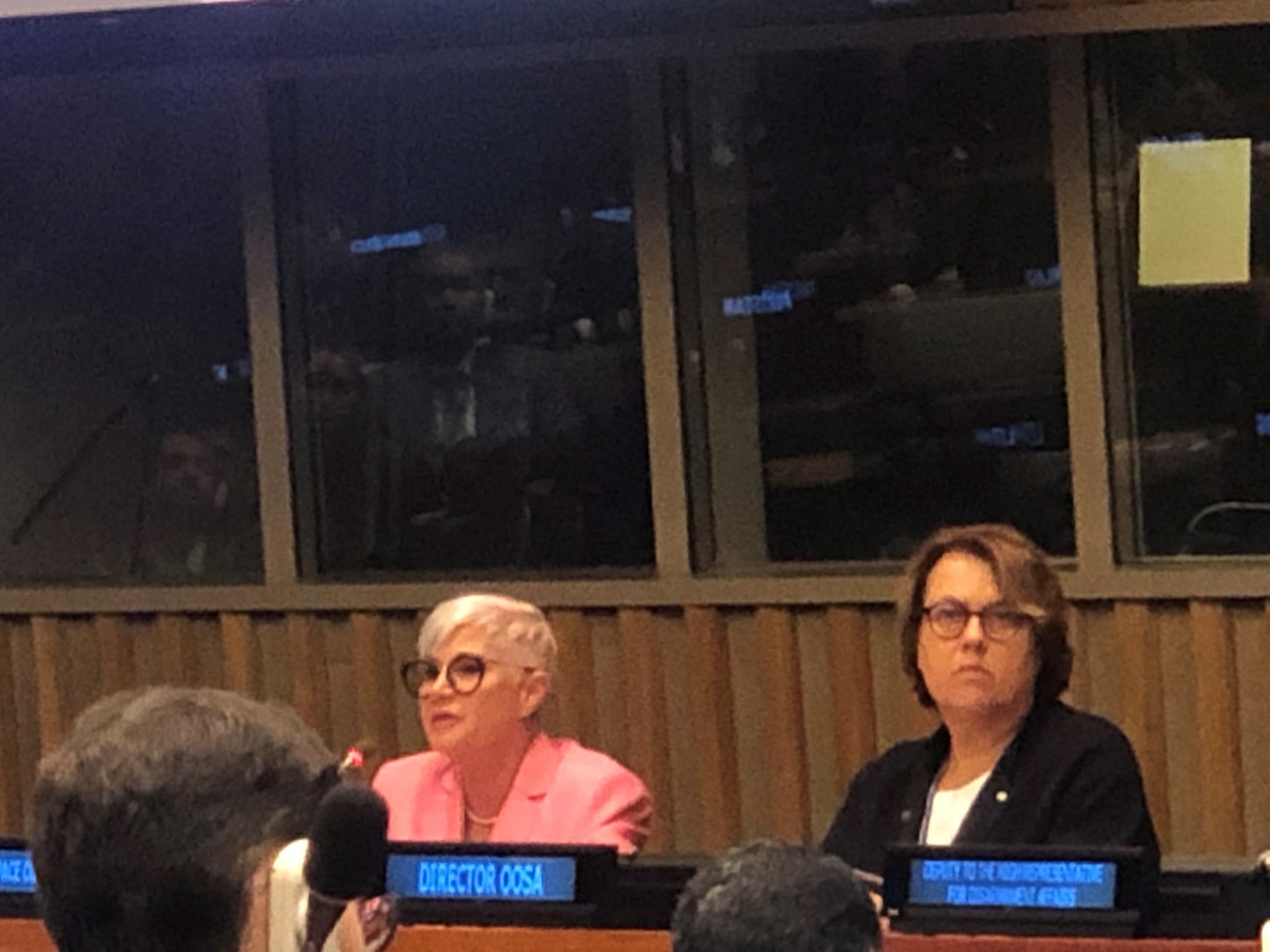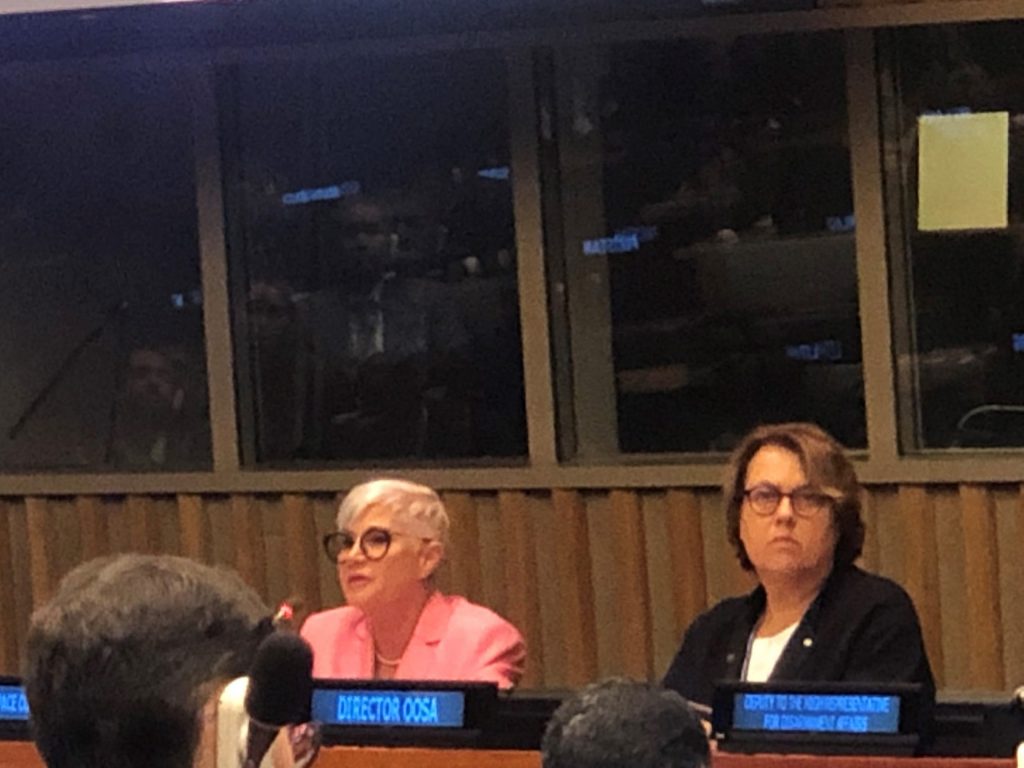OSC Remarks at UN General Assembly


On October 31, OSC Chief Counsel Diane Howard delivered remarks during a panel discussion on possible challenges to space security and sustainability. The panel was jointly organized by the First Committee (Disarmament and International Security) and Fourth Committee (Special Political and Decolonization) of the General Assembly of the United Nations.
Below are her remarks as prepared for delivery.
Co-Chairs of the First and Fourth Committees,
Good morning. My name is Diane Howard and I speak on behalf of Mr. Kevin O’Connell, the Director of the Office of Space Commerce at the U.S. Department of Commerce. Our office thanks the Office of Outer Space Affairs and the Office of Disarmament for the invitation to highlight the role of the commercial sector in addressing possible challenges to space security and sustainability.
We are seeing incredible space entrepreneurship in the United States and around the world, which is certain to change the nature of space security and sustainability. Some entrepreneurs are bringing forward new and enhanced capabilities in areas like communications, navigation, and remote sensing, designed to enhance our lives on earth, while other entrepreneurs are bringing forth wholly new capabilities like space-based manufacturing, on-orbit servicing, and space tourism, even in addition to capabilities designed to help us explore the heavens to the Moon and Mars and beyond. The global space economy today is estimated at 400 billion U.S. dollars and expected to reach between one and three trillion dollars trillion by 2040. In essence, the future of space is projected to be overwhelmingly commercial.
This means that our thinking about space must shift from a traditional security mindset to one that incorporates more robust thinking about space safety and sustainability. And an environment which is more collaborative in the name of space safety and sustainability. At the U.S. Department of Commerce, our view is that a more robust commercial environment in space also improves space security, as many more nations benefit from both the additional services created from space but also the economic opportunities and scientific benefits that space provides to all countries.
It is often misunderstood — or sometimes misrepresented — that commercial actors do not care about space safety and sustainability.
That is false. Space safety and sustainability are key to economic growth, protection of investment, and continuing service provision and innovation on behalf of customers here on earth.
During the most recent session of the Committee on the Peaceful Uses of Outer Space’s Scientific and Technical Subcommittee, Mr. O’Connell emphasized this in a technical presentation on the U.S. National Space Traffic Management Policy. The interrelationship between commercial success and space safety and sustainability has also been highlighted by U.S. and other commercial actors in technical presentations at COPUOS as well as at several recent workshops organized by the UN Institute for Disarmament Research.
As one example of a private sector response, the recently announced Space Safety Coalition is a group of companies and other organizations that actively promotes responsible space safety through the adoption of international standards, guidelines, and practices. One of these companies spearheaded an initiative to promote space safety and sustainability through responsible design, launch, and operational practices, including end of life practices.
Another industry led effort is the Consortium for Execution of Rendezvous and Servicing Operations (CONFERS). Here, a consortium of stakeholders is actively involved in articulating practices and developing standards for on-orbit servicing. This is particularly important. Successful commercial execution of rendezvous and proximity operations is key to the paradigm shift in the burgeoning space economy we see ahead.
Daily, companies approach us at the Department of Commerce with ideas about how to make space safer and more sustainable from both an economic and security perspective. In April of this year, the Department issues a Request for Information on Commercial Capabilities in Space Situational Awareness and Space Traffic Management. The inputs we received highlighted industry’s commitment to space safety, and called for an open architecture data repository for SSA data. This will allow collaboration, including international collaboration, and leverage private sector innovation.
One of my colleagues at the Office of Space Commerce, Mark Mulholland, has noted that such collaborations can build upon lessons learned from collaborations on weather forecasting. As he recently noted, collaboration on weather forecasting relies on sensors of many types and operated by both governments and the private sector. This sensor data, both current and historical, is processed using peer reviewed algorithms to produce forecast data containing the best predictions possible with the lowest statistical uncertainties. Sensor observations are good; more sensor observations are better within this open architecture.
In their collaborations through this open architecture, meteorologists around the world agree upon common data formats, common quality standards, common algorithms and common sensor characteristics. They meet frequently to review and update these agreements, technical parameters and forecast techniques. They share their successes and their failures. All of this is done in a spirit of openness, cooperation and of sharing results? Why? It’s simple: Severe weather is an equal opportunity destroyer of lives, property, and economies.
Looking ahead, the U.S. Department of Commerce sees similar opportunities for international collaboration on spaceflight safety. As one example, Commerce recently signed a declaration of intent with the French national space agency CNES. This declaration charts a path forward for space situational awareness and other important efforts driving the commercial development of space.
In signing this declaration, Secretary of Commerce Ross noted, “As we quickly race towards a trillion-dollar space economy, our relationship with CNES and other like minded institutions around the globe will become even more crucial.”
To summarize, the United States believes that an economically robust space domain is a more secure space domain. However, it is possible that some other space actors may be less ready or willing to engage in such public-private cooperation. This means that those nations that ARE collaborating will benefit from deliberate diplomatic long-term discourse about how the increasingly important private sector as well as new space actors can have positive impact from a space security perspective…discourse such as this panel in this forum.
Thank you.